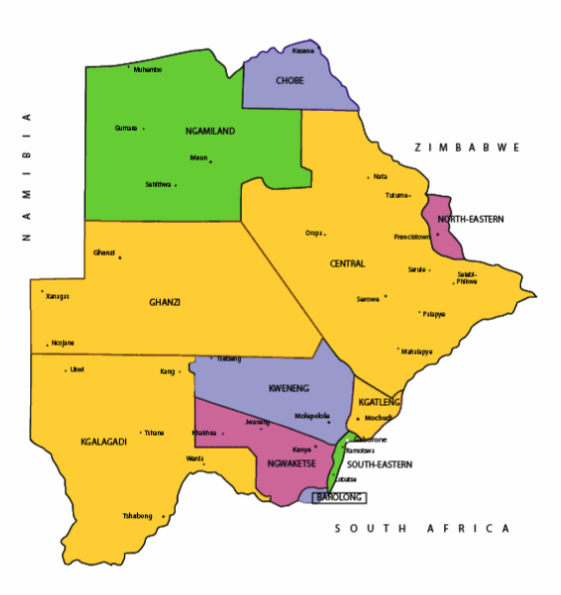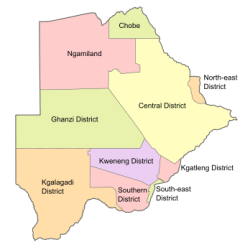Places and their polling stations in Nkange, Botswana
092 Maitengwe North
0478 Maitengwe Primary School
0479 Moses Mengwe JSS
0480 Sabasi Tent
0481 Nshamba Primary School
093 Maitengwe South
0482 Mengwe Primary School
0483 Non Formal Education Centre (Tent)
0484 Dagwi Primary School
0485 Monyama Kgotla
094 Nkange North
0486 Nkange Primary School
0487 Fungwane Kgotla (Tent)
0488 Ndzonga Kgotla (Tent)
0489 Nyewele Kgotla (Tent)
0490 Changate Primary School
0491 Nkange JSS
095 Nkange South
0492 Senete Primary School
0493 Senete Kgotla
0494 Mabuwe Primary School
0495 Dziba Health Stop
0496 Nchemane Kgotla
0497 Moletswe Kgotla
096 Tutume North
0498 Madikwe Kgotla
0499 Selolwane Primary School
0500 Luthren Day Care Centre
0501 St. John Church
097 Tutume West
0502 Thini Primary School
0503 Head Mountain Apostolic Church (Tent)
0504 Thini Clinic
0505 Thini Kgotla
098 Tutume South
0506 Old Apostolic Church
0507 Pandagala JSS
0508 Mathumo Kgotla
0509 Timbi Primary School
0510 Maphorisa Primary School
099 Tutume East
0511 Tutume Main Kgotla
0512 Community Hall Site
0513 Magapatona Primary School
0514 Nsuswane Cattle Crush (Tent)
100 Matobo-Goshwe
0515 Goshwe Primary School
0516 Ntobgwe Standpipe Tent
0517 Mpiti Primary School
0518 Chilokoti Health Stop
101 Nswazwi-Makuta
0519 Nswazwi Primary School
0520 Makuta Old Mobile Health Stop (Tent)
0521 Madawu JSS
0522 Makuta Primary School
0523 Nswazwi Cooperative Store
Reference: iec.gov.bw/index.php/electoral-districts/polling-stations.html
Botswana
Botswana is a country in Africa. It is topographically flat, with approximately 70 percent of its territory being the Kalahari Desert.
It is bordered by South Africa to the south and southeast, Namibia to the west and north, and Zimbabwe to the northeast.
Capital: Gaborone
Currency: Botswanan Pula
Official language: English
Population: 2.588 million (2021) World Bank
Dialing code: +267
Gross Domestic Product: 17.61 billion USD (2021) World Bank
Botswana’s ten districts are:
- Southern District
- South-East District
- Kweneng District
- Kgatleng District
- Central District
- North-East District
- Ngamiland District
- Kgalagadi District
- Chobe District
- Ghanzi District
Botswana’s councils created from urban or town councils are: Gaborone City, Francistown, Lobatse Town, Selebi-Phikwe Town, Jwaneng Town, Orapa Town and Sowa Township.






The name Botswana refers to ‘Land of the Tswana’. The landlocked, Southern Africa country is officially known as the Republic of Botswana.














Botswana is connected to Zambia through the Kazungula Bridge making it the world’s shortest border between two countries.
A country of slightly over 2 million people (2021), Botswana is one of the most sparsely populated countries in the world. It is essentially the nation state of the Tswana ethnic group, who make up 79% of the population.

About 11.6 per cent of the population lives in the capital and largest city, Gaborone.
Formerly one of the world’s poorest countries—with a GDP per capita of about US$70 per year in the late 1960s—it has since transformed itself into an upper-middle-income country, with one of the world’s fastest-growing economies.


The Tswana ethnic group were descended mainly from Bantu-speaking tribes who migrated southward of Africa to modern Botswana, living in tribal enclaves as farmers and herders.




In 1885, the British colonised the area and declared a protectorate under the name of Bechuanaland.
As colonisation stopped, Bechuanaland became an independent republic under its current name on 30 September 1966.


Since then, it has been a representative republic, with a consistent record of uninterrupted democratic elections and the lowest perceived corruption ranking in Africa since at least 1998.

The economy is dominated by mining and tourism. Botswana has a GDP (purchasing power parity) per capita of about $18,113 as of 2021, one of the highest in subsaharan Africa.


Botswana is the world’s biggest diamond producing country.
Its relatively high gross national income per capita gives the country a high standard of living and the third-highest Human Development Index of continental Sub-Saharan Africa (after Gabon and South Africa).
The country has been adversely affected by the HIV/AIDS epidemic. In 2002, Botswana began offering anti-retroviral drugs (ARVs) to help combat the epidemic.
Botswana is a member of the Southern African Customs Union, the Southern African Development Community, the Commonwealth of Nations, and the United Nations.

